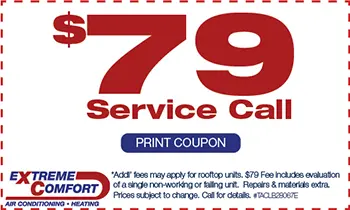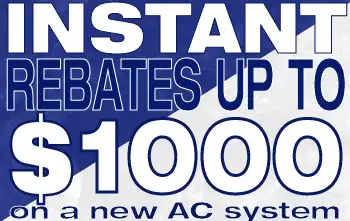How often do I need to change my home air filter?
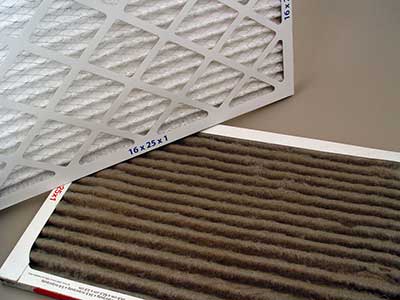
Why do you need to change your home air filter?
Before we answer the question of how often should I change my home air filter, it is first essential to understand the purpose of an air filter. All heating and air conditioning systems have a home air filter that can help rid your house of allergens, dirt, dust particles, pet dander, etc. In addition to harming your body and negatively affecting your breathing, these particles can damage your heating and air conditioning system, reducing its effectiveness and costing you money.
The United States Department of Energy reports that changing your home air filter can improve the efficiency of your HVAC equipment by 5% to 15%, which could result in hundreds of dollars every year.
How often should you change your air filter?
The simple answer is when it is dirty.
Generally, most 1” home air filters should be changed at least every 1 to 3 months. Larger, pleated cartridge-type home air filters (3″ to 5″) can last up to 12 months between changes.
However, how often to change your air filters depends on a few factors, such as:
- the type of air filter you are using (see below)
- the quality of the air inside your home
- the number and type of pets that live in your home
- the number of people occupying the home
- the level of air pollution in the city where you live
- the amount of construction around your home
A good rule of thumb is to check your home air filter once a month. A clean filter will help your heating and air conditioning (HVAC) system run more energy efficiently. Having a dirty home air filter is a good thing; this means the filter is doing its job by filtering out dust and pet dander from the air you breathe. One key is to use a filter with a good MERV rating.
What does MERV Rating have to do with choosing an air filter?
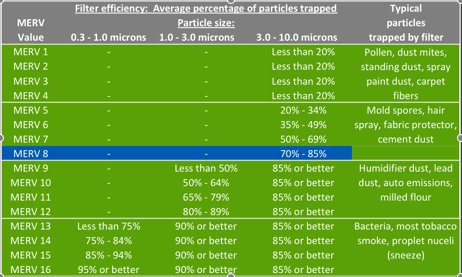
MERV stands for Minimum Efficiency Rating Value. This industry-standard rating system allows you to compare filters made by different
manufacturers. A MERV rating is a numerical value ranging from 1 (lowest efficiency) to 20 (highest efficiency) and tells the consumer how well the filter captures and holds dirt and dust of a specified size range. The chart below shows the MERV ratings, corresponding particle size ranges, and efficiency level as measured by the percentage of particles captured.
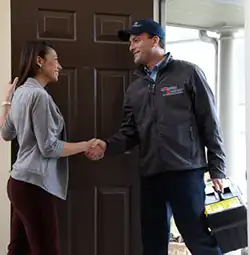
Schedule Service
Which Type of Air Filter Do You Need?
There is a vast difference between a cheap $1.98 fiberglass home air filter (you know…those bright blue ones encased in a flimsy cardboard frame) and a higher quality pleated or HEPA filter.
- Economy panel fiberglass filters – A fiberglass home air filter is very thin and has a flat panel surface for trapping air particles. Originally developed to protect heating and air conditioning equipment, these air filters are not intended to improve indoor air quality. They can often be purchased for less than $1; unfortunately, they remove less than 10% of the air pollutants from your home. They have a MERV rating between 1 and 4.
- Pleated filters – Pleated air filters can remove up to 45% of the air pollutants from your home. The number of pleats per foot will impact the filter’s overall efficiency. They usually cost around $10 each and have a MERV rating of 10 to 13.
How Many Pleats Do I Need? The filter with more pleats per foot across the face will give you better airflow throughout your home. The more air that flows through your house, the more often it is passed and re-circulated through the air filter. The result is cleaner air because of the higher frequency of air passing through the filter.
- Electronic filters – These filters are reusable but can get dusty quickly. Although the dust typically does not negatively impact airflow, it quickly affects the ability to filter the air.
- HEPA (High-Efficiency Particulate Air) filters – True HEPA filters provide the best filtration by removing up to 98% of air pollutants. They have a MERV rating between 17 and 20.
Although HEPA filters are the most efficient, unfortunately, HEPA filters restrict too much air to be used as a traditional furnace filter. A HEPA filter is highly efficient, but a significant amount of air pressure is needed to force air through a HEPA filter. A typical HVAC system will not be equipped to provide enough air pressure to use a HEPA filter (which means that no air would blow out of your registers).
A clean home air filter will help save you money on energy costs, help improve the overall life expectancy of your HVAC system, and improve the quality of the air you breathe daily. Contact us today to have your air filter checked or replaced.


